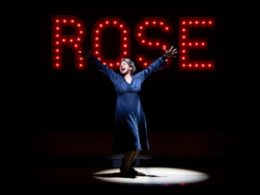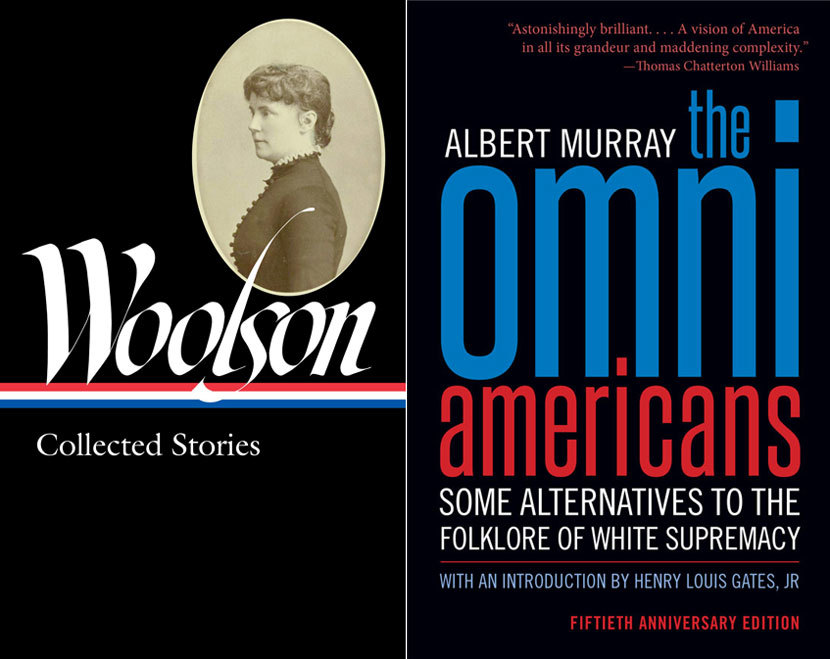
The enduring relevance of classic American writing is on ample display in the Library of America titles slated for release in the first half of 2020, as we welcome four new writers to the series and present four groundbreaking new anthologies. Among the highlights: an unheralded nineteenth-century writer finally receives her due; a pair of decorated novelists dramatize the turmoil of the last most divisive era in American life; a leading historian and political commentator offers an essential portrait of American conservatism; and a new collection reveals the hold that birds have long had on the American imagination. We also bring the classic Western into the series with a volume collecting four landmark novels from the 1940s and ’50s and reissue one of the most important books on race in America in a new fiftieth anniversary paperback edition.
Browse the list below for information about contents and publication dates; scroll further down the page for a more detailed description of each new title.
LIBRARY OF AMERICA SERIES
John Updike
Novels 1968–1975
Christopher Carduff, editor
Couples • Rabbit Redux • A Month of Sundays
Library of America #326 / ISBN 978-159853-649-2
January 2020
Constance Fenimore Woolson
Collected Stories
Anne Boyd Rioux, editor
Library of America #327 / ISBN 978-159853-650-8
February 2020
Robert Stone
Dog Soldiers, A Flag for Sunrise, Outerbridge Reach
Madison Smartt Bell, editor
Library of America #328 / ISBN 978-159853-654-6
March 2020
Richard Hofstadter
Anti-Intellectualism in American Life, The Paranoid Style in American Politics, Uncollected Essays 1956–1965
Sean Wilentz, editor
Library of America #330 / ISBN 978-159853-659-1
May 2020
Jonathan Schell
The Fate of the Earth, The Abolition, The Unconquerable World
Martin J. Sherwin, editor
Library of America #329 / ISBN 978-159853-658-4
May 2020
The Western: Four Classic Novels of the 1940s & 50s
Ron Hansen, editor
Library of America #331 / ISBN 978-159853-661-4
June 2020
American Women’s Suffrage: Voices from the 200-Year Struggle for the Vote
Susan Ware, editor
Library of America #332 / ISBN 978-159853-664-5
July 2020
SPECIAL PUBLICATIONS
American Birds: A Literary Companion
Terry Tempest Williams and Andrew Rubenfeld, editors
ISBN 978-159853-655-3
March 2020
American Conservatism: Reclaiming an Intellectual Tradition
A Century of Writings from Henry Adams to Today
Andrew J. Bacevich, editor
ISBN 978-159853-656-0
April 2020
American Democracy: 21 Historic Answers to 5 Crucial Questions
Essential Writings from The Federalist to Citizens United
Nicholas Lemann, editor
ISBN 978-159853-662-1
August 2020
PAPERBACK
Albert Murray
The Omni-Americans: Some Alternatives to the Folklore of White Supremacy
50th Anniversary Edition
With an introduction by Henry Louis Gates, Jr.
ISBN 978-159853-652-2
February 2020
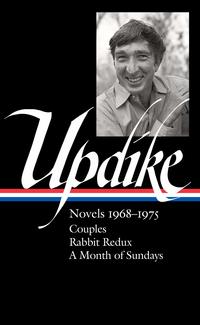
Library of America’s definitive John Updike edition continues with three masterful novels on the joys and the discontents of the sexual revolution. Novels 1968–1975 collects the scandalous Couples, the brilliant Rabbit Redux, and the uproarious A Month of Sundays—an unforgettable triptych of the social turbulence that roiled America from the Kennedy to the Nixon years. These books not only reveal Updike’s genius in characterization and his formal versatility as a novelist but also delve into the complexities of sex and marriage, social class and personal morality, and the difficult quandaries of the flesh and the spirit. As a special feature the volume also includes two short pieces that shed light on the novels and the tale “Couples: A Short Story,” the origin of the novel of the same name, written in 1963 but considered too racy for publication by The New Yorker.
Constance Fenimore Woolson: Collected Stories marks the entry into the Library of America series of a nineteenth-century writer whose reputation again approaches what it was in her own lifetime, when she was considered with George Eliot one of the two greatest women writers of the English language. A realist who belongs in the company of Henry James and William Dean Howells, Woolson (1840–1894) wrote short fiction often centered on outsiders of one kind or another—prophets and misfits living in remote landscapes, uneducated coal miners, impoverished spinsters, neglected nuns, a haunted caretaker of the dead, destitute southerners, and female artists driven to extreme behavior as they seek the admiration or approval of established (male) critics or writers. Edited by Woolson’s biographer Anne Boyd Rioux, Collected Stories is the largest and most comprehensive collection of Woolson’s short fiction ever assembled, and the culmination of two decades’ worth of scholarly recovery work.
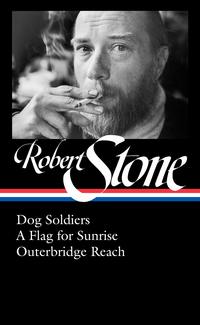
Robert Stone: Dog Soldiers, A Flag for Sunrise, Outerbridge Reach collects, for the first time in one volume, three gripping novels by the writer Joyce Carol Oates has called “a great American writer in the tradition of Melville, Hawthorne, Dreiser, Dos Passos, and Hemingway.” The National Book Award–winning Dog Soldiers (1974), in which an ill-fated scheme to smuggle three kilos of heroin from South Vietnam to California sets in motion a lethal chase across a nightmarish landscape populated by poseurs, hustlers, psychopathic criminals, and failed gurus, ranks with the work of Michael Herr and Tim O’Brien as a psychological reckoning with how Vietnam changed America. A Flag for Sunrise (1981) depicts a leftist revolution in the fictious Central American country of Tecan and its impact on three North Americans; through their fates Stone explores the search for moral order in a terrifying universe beset by fear and evil. In Outerbridge Reach (1992) Owen Browne, a Navy veteran of Vietnam turned boat salesman, seeks to test his courage amid the materialism, corruption, and superficiality of 1980s America by entering a solo around-the-world yacht race. Alone in the South Atlantic, Browne discovers his capacity for deception and enlightenment in a sea tale worthy of Conrad.
Richard Hofstadter’s Anti-Intellectualism in American Life (1963) and The Paranoid Style in American Politics (1965) are two essential works that lay bare the irrationalism, demagoguery, destructive populism, and conspiratorial thinking that have long influenced American politics and culture. Whether underground or—as in our present moment—out in the open, these currents received their authoritative treatment from Hofstadter at a time when many public intellectuals and scholars didn’t take them seriously enough. The two classics are supplemented with seventeen trenchant essays, chosen by editor Sean Wilentz, that reflect the range of Hofstadter’s interests and the depth of his insights: discussions of the Constitution’s framers, the personality and legacy of FDR, higher education and its discontents, and the relationship of fundamentalism to right-wing politics.
To mark the seventy-fifth anniversary of the dawn of the nuclear age, Library of America will bring together three fearless, eloquent, and controversial works by Jonathan Schell, first published between 1982 and 2003, that illuminate the nuclear threats our civilization continues to face and dare to imagine a way forward to peace. In 1982’s The Fate of the Earth—an international bestseller that inspired the nuclear freeze movement—Schell distilled the best available scientific and technical information to imagine the apocalyptic aftereffects of nuclear war. Dramatizing the stakes involved in abstract discussions of military strategy, the book galvanized public consciousness and changed the terms of the debate over nuclear arms. The Abolition (1984) extended this work to argue—against a complacent acceptance of “the stability of the nuclear world” and conventional theories of deterrence—that pathways to disarmament exist, and that the ultimate elimination of nuclear weapons is an achievable goal. The Unconquerable World: Power, Nonviolence, and the Will of the People (2003), a surprisingly hopeful historical analysis of the changing nature of warfare through the end of the twentieth century in which Schell envisions how a lasting peace might be sustained, rounds out this vitally important edition.
The Western: Four Classic Novels of the 1940s & 50s collects, in one volume, a quartet of unforgettable novels of honor, adventure, and violence set against the magnificent landscapes of the American West. Final selection to be unveiled later this summer.
With a record number of female candidates in the 2020 election and gender equality an increasingly urgent topic in the news, the time is ripe for the full, definitive story of the movement for voting rights in all its diversity and intersectionality. American Women’s Suffrage: Voices from the 200-Year Struggle for the Vote tells that story of the women and men who lived it: the most recognizable figures in the campaign for women’s suffrage, like Elizabeth Cady Stanton and Susan B. Anthony, but also the black, Chinese, and American Indian women and men who were not only essential to the movement but expanded its directions and aims, and the anti-suffragists who worried about where the country would head if suffrage were universal. Expertly curated and introduced by scholar Susan Ware, these 100 pieces by over eighty writers tell the full history of the movement—from Abigail Adams to the Declaration of Sentiments to the passage of the Nineteenth Amendment and the limiting of suffrage under Jim Crow.
Americans have always been fascinated by birds—and from the beginning, some of our greatest writers have captured this keen interest in a variety of genres: poems, journal entries, memoirs, short stories, essays, and travel accounts. American Birds: A Literary Companion brings together the very best of this writing on America’s birds, in a collection that ranges from the Aleutian Islands and the Florida Keys to the Maine woods, the deserts of the southwest, and even to our own gardens and backyard feeders. Edited by Terry Tempest Williams and Andrew Rubenfeld, American Birds is both a celebration of the mysterious creatures we love and field guide to the American soul. Join Lewis and Clark as they cross the continent, Audubon as he sketches in New Orleans, Emerson and Thoreau on a ramble around Walden Pond, Rachel Carson as she observes a skimmer on the Atlantic coast, and Roger Tory Peterson casting a keen eye on snail kites and limpkins in the Everglades. These writers are joined by an array of modern and contemporary poets who celebrate the wonder of birds and the joys of bird watching.
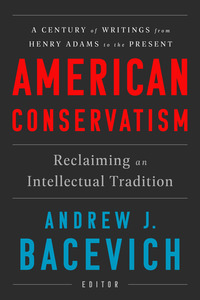
As the modern conservative movement stands at a crossroads, Andrew Bacevich’s American Conservatism: Reclaiming an Intellectual Tradition redefines a strain of political thought whose insights, debates, and defiance have profoundly shaped our national life. In a sweeping gathering of forty-five essential conservative writers, Bacevich surveys the core currents of conservative thought in the United States since 1900: the importance of tradition, the value of familial and local ties, the mounting of resistance to an ever-expanding state, the opposition to collectivist utopias and other forms of tyranny abroad, and the necessity of free markets and economic growth to sustain individual liberties and prosperity. On display here are impassioned arguments about bedrock beliefs: Andrew Sullivan’s influential conservative case for same-sex marriage before the prospect was widely taken seriously is joined by Antonin Scalia’s dissent in the Obergefell case before the Supreme Court, which made same-sex marriage the law of the land. Writings by isolationists stand side by side with neoconservative calls for foreign intervention; well-known names such as Charles Beard, Ronald Reagan, and William F. Buckley are complemented by less familiar figures such as Richard Weaver and Robert Nisbet. Additionally, certain writers not often thought of as conservative—Jane Jacobs, Joan Didion—are shown to possess ideas that align with key concerns of thinkers on the right.
Lastly, for Black History Month Library of America is proud to publish a special fiftieth anniversary paperback edition of Albert Murray’s The Omni-Americans, with a new introduction by Henry Louis Gates, Jr. Murray’s 1970 debut announced the arrival of a major new force in American letters, as he took aim at protest writers and social scientists who accentuated the “pathology” of race in American life and the marginalization and victimhood of black Americans and countered that African American art and culture, particularly jazz and blues, stand at the very headwaters of the American mainstream. For a new generation of readers, this accessible, handsome standalone edition will demonstrate that Murray’s pluralistic vision is more relevant today than ever before.


